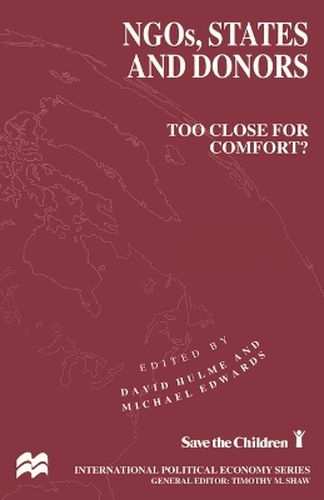Readings Newsletter
Become a Readings Member to make your shopping experience even easier.
Sign in or sign up for free!
You’re not far away from qualifying for FREE standard shipping within Australia
You’ve qualified for FREE standard shipping within Australia
The cart is loading…






This title is printed to order. This book may have been self-published. If so, we cannot guarantee the quality of the content. In the main most books will have gone through the editing process however some may not. We therefore suggest that you be aware of this before ordering this book. If in doubt check either the author or publisher’s details as we are unable to accept any returns unless they are faulty. Please contact us if you have any questions.
In the last decade the use of non-governmental agencies (NGOs) to promote development and reduce poverty and hunger has become a major feature of development policy. Donors have poured funds into NGOs, governments have allocated them major responsibilities and their number and size has grown. Has this popularity helped them to solve the problems of poverty or has it changed them so that they are now part of the ‘development industry’ that they used to criticize? This book provides the most detailed study available of the ways in which NGO-State-Donor relationships have changed the role that NGOs play in development. Its papers are introduced by two international experts on the topic and the contributors are leading academics and senior practitioners. The picture that emerges from the general reviews and detailed case studies of African, Asian and Latin American NGOs, is a complex one. However, the authors conclude that there is much evidence that NGOs are ‘losing their roots’ - getting closer to donors and governments and more distant to the poor and disempowered who they seek to assist.
$9.00 standard shipping within Australia
FREE standard shipping within Australia for orders over $100.00
Express & International shipping calculated at checkout
This title is printed to order. This book may have been self-published. If so, we cannot guarantee the quality of the content. In the main most books will have gone through the editing process however some may not. We therefore suggest that you be aware of this before ordering this book. If in doubt check either the author or publisher’s details as we are unable to accept any returns unless they are faulty. Please contact us if you have any questions.
In the last decade the use of non-governmental agencies (NGOs) to promote development and reduce poverty and hunger has become a major feature of development policy. Donors have poured funds into NGOs, governments have allocated them major responsibilities and their number and size has grown. Has this popularity helped them to solve the problems of poverty or has it changed them so that they are now part of the ‘development industry’ that they used to criticize? This book provides the most detailed study available of the ways in which NGO-State-Donor relationships have changed the role that NGOs play in development. Its papers are introduced by two international experts on the topic and the contributors are leading academics and senior practitioners. The picture that emerges from the general reviews and detailed case studies of African, Asian and Latin American NGOs, is a complex one. However, the authors conclude that there is much evidence that NGOs are ‘losing their roots’ - getting closer to donors and governments and more distant to the poor and disempowered who they seek to assist.